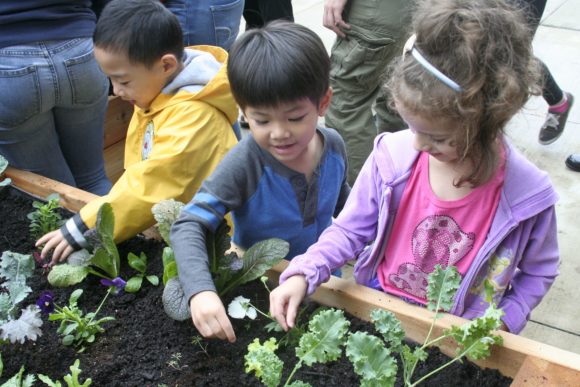
IFNH Nursery School students. Photo: Jennifer Simon.
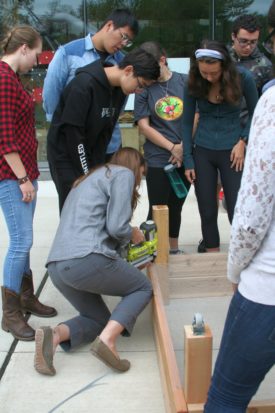
Byrne Seminar students building the raised beds with instructor Ariana Lindberg using the staple gun. Photo: Jennifer Simon.
Twenty Rutgers students from the Byrne Seminar, “Building a Schoolyard Garden,” created the first living laboratory on the George H. Cook campus that is dedicated to the preschoolers in the Culture of Health Academy, a nursery school located on the ground floor of the Institute for Food, Nutrition and Health (IFNH). The academy, which operates as a partnership between the Center for Childhood Nutrition Education and Research at IFNH and the Rutgers Psychology Child Development Center is a focal point of the New Jersey Healthy Kids Initiative, a program launched earlier this year to achieve health equity for all children.
Building a schoolyard vegetable garden in a corner of the playground was a perfect complement to the nursery school’s 2018 curriculum, which is devoted to nutrition-based programs and healthy eating.
Associate professor Holly Nelson and instructor Ariana Lindberg, both of the Department of Landscape Architecture, led this particular Byrne Seminar—a one-credit course designed to introduce first-year students at Rutgers-New Brunswick to academic life. Limited to 20 students, participants get to experience the excitement of original research as faculty members share their curiosity, their intellectual passion and how they develop new ideas and fields of knowledge.
When the Byrne students arrived on the first day carrying all of the construction materials, one of the children, Samuel, asked, “Is it Christmas?” This general sense of wonder and excitement continued as the children watched the students work together to construct two movable raised planters, fill them with soil and plant a variety of vegetables and edible flowers. First-year student Sydney Jenkins said this about the experience, “The kids’ constant curiosity in our work reminded me of the reason I loved school in the first place.”
A major component of this project was planning and problem solving. Students had to consider the layout of the beds and how to plant the plants. They also had to make sure all the edges were safe for little fingers. “When one of the planters broke, we reinforced the bottom with stronger wood to ensure it wouldn’t break again,” said Emily Brzozowski.
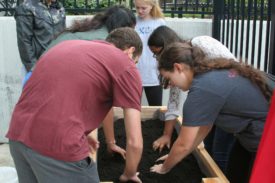 Serena McKieran, who aspires to be a high school physics teacher and whose team presented a lesson about how plants eat and drink, reflected on the overall seminar experience. “Reading the passages about the values of outdoor learning was super thought-provoking. I will definitely be considering the benefits of natural learning—something that is often ignored after elementary school. Gardens and the outdoors in general have this unparalleled power to spark curiosity and keep people engaged. Interacting with the kids was also a really valuable aspect for me because of my desire to teach.”
Serena McKieran, who aspires to be a high school physics teacher and whose team presented a lesson about how plants eat and drink, reflected on the overall seminar experience. “Reading the passages about the values of outdoor learning was super thought-provoking. I will definitely be considering the benefits of natural learning—something that is often ignored after elementary school. Gardens and the outdoors in general have this unparalleled power to spark curiosity and keep people engaged. Interacting with the kids was also a really valuable aspect for me because of my desire to teach.”
Seminar students also read and discussed excerpts from Richard Louv’s Last Child in the Woods and worked in teams to develop pre-school level lesson plans centered around gardening and sensory exploration.
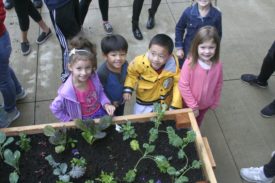
IFNH Nursery School students. Photo: Jennifer Simon.
Other lesson plans included a board game for learning colors and vegetables; Vegetable Superheroes, an exploration of nutrition through vegetable superpowers and From Seedling to Salad, a look at the growth stages of plants.
The seminar gave Rutgers students the opportunity to get their hands dirty through building and planting, but more importantly, it fostered the practice of working together towards a common goal in service to the youngest members of the campus community. As freshman Valerie Collado shared at the completion of the project, “I learned how to use a drill and loved the comradery that resulted from working together to create something.”
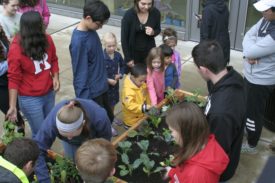
Byrne Seminar students and nursery school students inspecting the finished raised beds. Photo: Jennifer Simon.
About the Byrne Seminar Program:
Each year the Byrne Program explores a particular theme through more than 140 seminar offerings. In 2018-2019, the Byrne Program explores the theme, Diversity of Methodologies/Methodologies of Diversity, suggesting both the boundless possibilities of academic inquiry, and new and innovative ways professors teach and students learn.

